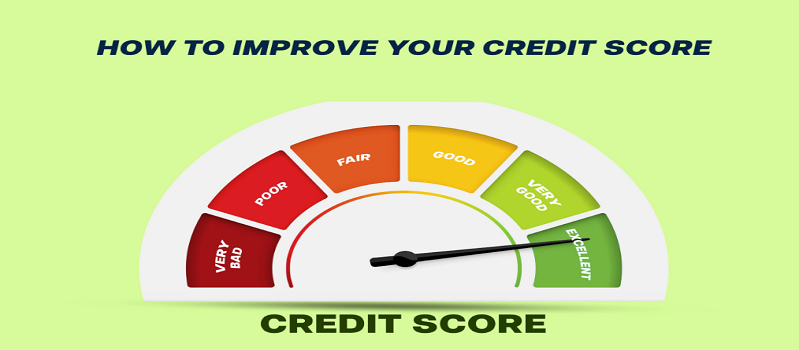
A good credit score saves you money over the years through better loan rates and more. The good news is you can take charge of improving your scores through positive habits without relying on credit repair companies.
A higher credit rating proves to banks, card issuers and lenders that you pay borrowed money back reliably. This earns you lower interest rates, which makes life less expensive! Good credit also makes applying for a mobile plan, renting a nice flat, and even landing some jobs easier.
Things like paying bills on time, limiting applications for new credit and keeping card balances under 30% of your limit all contribute within months.
A Guide To Improve Your Credit Scores
Pay Down Outstanding Balances
You should focus first on paying down debts with high interest rates. These cost you the most money over time in interest charges. Pay as much as you can toward the high-interest debts each month.
The “snowball method” can also help you pay off small balances quickly. Make minimum payments on all debts except the smallest balance. Put as much extra money as possible towards the smallest debt until it’s fully paid off. Then, roll that payment amount into the next smallest debt. This builds momentum like a snowball rolling downhill.
If possible, make multiple monthly payments on debts rather than one payment. Even paying an extra £20 or £50 mid-month will lower your overall balance faster.
The key things are bringing down the amounts owed overall and repaying debts on time each month. Doing this diligently will raise your credit score without needing professional help.
Reduce Your Credit Utilisation Rate
You should aim to keep your credit card balances below 30% of your overall credit limit. If your limit is £1,000, try not to owe over £300 each month. Paying down balances lowers your “utilisation rate”, which helps your scores.
You can ask lenders to increase your credit limits, but take care of it before doing so. A higher limit means you can charge more, which could lead to getting in over your head. Be cautious and thoughtful here.
You should consider using cash, your debit card, or prepaid cards more often instead of credit cards for everyday spending. Funnelling less through your credit cards naturally keeps your balances lower relative to limits. It also avoids the temptation to overspend.
Check each statement and pay in full, pay more than minimums or pay twice monthly to keep utilisation down. Keeping your balances modest compared to credit ceilings demonstrates responsible usage over time.
Make All Payments on Time
Making all your payments on time is crucial for improving your credit score fast on your own.
You set up direct debits from your bank account to automatically pay at least the minimum due on credit cards and loans each month. You can also use calendar reminders to make payments by the due date manually.
You pay priority bills like your mortgage, utilities, and telecom services first when budgeting. Falling behind on essential costs can bring heavier consequences than other expenses. You protect your housing, power access and other basic needs.
You will have to understand that even one late payment can negatively impact your credit score. Multiple late payments or payments over 90 days late do even more damage. Timeliness shows lenders you manage credit responsibly.
You can rebuild scores over time by establishing a record of on-time payments month after month. However, poor payment history has an immediate impact. Avoid lateness to keep your credit scores trending upward.
Avoid New Hard Inquiries
Every application for credit – whether it’s a new credit card, loan or mortgage – requires a “hard pull” check of your credit. This temporarily causes a small drop in your credit scores. So, try to avoid applying for a lot of new credit in a short timeframe.
If you don’t have homeowner status, guarantor loans for non-homeowners can provide an option without stringent credit checks. If someone with a good income and credit history guarantees the loan, requirements are less strict for you. This allows access to financing if your income is decent.
You understand that the impact on your scores from a single new application is generally minor and temporary. As long as you keep practising good credit habits, your scores will rebound in a matter of months.
You can check your own credit report and FICO or Equifax credit score totals by using free soft search tools online. Soft inquiries don’t require giving your personal details or triggering hard checks. They help you monitor where your credit stands on an ongoing basis.
Become an Authorised User
If you have a family member or friend with a strong credit history and a low-balance credit card, ask if they will add you as an “authorised user” to their account. This links their positive credit record to your reports even if you never actually use the card.
Make sure to pursue this option only with someone financially responsible. You want to associate your credit profile with reliable cards that maintain low balances and on-time payments.
Before being added as an authorised user, check that the card provider fully reports user activity to agencies like Experian and Equifax. Some issuers don’t, which prevents you from benefiting through improved credit visibility.
You capitalise on the main cardholder’s prudent management. Even with no personal card history, tying yourself to their strong payment performance can strengthen your scores over time.
Diversify Your Credit Mix
Having different types of credit can help your scores, but focus on managing what you have first. Applying for new credit only to diversify your mix risks unnecessary checks and debt.
Credit scoring tools in the UK eventually saw responsibility for various products – credit cards, personal loans, auto financing, and so on- over decades. This shows you can handle accounts with different rules and terms in a stable way for a long time.
But don’t worry about checking boxes and rushing into new loans now just for variety. If you make payments on time and keep low card balances for a year or two first, you prove reliability with what you already have. This matters more than having unused new products temporarily.
For example, properly paying guarantor loans for non-homeowners shows stable borrowing habits better than opening a store card you won’t use much. This will relieve your guarantor from the loan as well. You build healthy diversity slowly over life stages rather than piling on new debt.
Wait for needs to change naturally with jobs, families, houses, etc. Focus today on smart money management with what you have. This helps your score while letting the mix evolve when your situation one day requires new lending.
Conclusion
Don’t worry if your credit rating moves slowly at first. Reforms stick when done steadily over the years, not hastily in weeks. Demonstrating that you manage debts and spend wisely now informs you of your credit potential for decades ahead!
The journey continues beyond a blog post, of course. But hopefully, the knowledge shared here regarding monitoring your own reports, becoming an authorised user on trusted accounts and letting your mix evolve over genuine needs empowers your path ahead.
Financial literacy is so important – when we do better, our families, communities, and the wider world will all benefit. Keep learning and stay encouraged.










